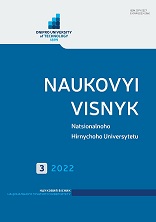

 | Наукова періодика України | 
| Naukovyi visnyk Natsionalnoho Hirnychoho Universytetu |
Horban O. The regulatory functions of education in behavioral models / O. Horban, О. Kravchenko, R. Martych, N. Yukhymenko // Науковий вісник Національного гірничого університету. - 2019. - № 3. - С. 152-157. - Режим доступу: http://nbuv.gov.ua/UJRN/Nvngu_2019_3_22 Purpose - to use the behavioral approach to distinguish and consider the main functions of education, which are used to manage and identify neurobiological and social systems. The authors used an interdisciplinary approach, in particular, the neurobiological, social and psychological, natural science and sociological concepts. The interdisciplinarity of the methodology allowed the authors to identify and reveal the regulatory functions of education on the basis of the behavioral approach. Developments in the field of neurophilosophy and neurosociology were of great methodological importance. In the work the authors used the methods of historicism, comparativism, analysis, synthesis, and others. The choice of a behavioral approach for the disclosure of the regulatory functions of education is explained by its mathematical and physical capabilities to model a wide range of neurobiological and social systems. In the problematic field of neurosociology, the authors examined the behavioral models that allowed them to identify and consider three key functions of education that, as external stimuli, affected the transitive core of neurobiological and social systems: a form-building function, which is fully disclosed in the behavioral model of the neurobiological and social system, in which the transitive core is the essence of arete. Arete, as a transitive core, consists of three existentials: mind or noos (vo<$Enu zeta> - "intellect"); knowledge or episteme (<$Eepsilon pi i sigma eta mu eta>); and techne (<$Etau epsilon chi nu eta>). A developing function, which regulates orientation of human self-realization. The developing function of education regulates features of manifestation of a transitive core, or establishes a certain vector of execution of the behavioral model of the neurobiological and social system. A stabilizing function, which brings neurobiological and social systems into a state of "global sustainabiіlity". The regulatory functions of education have the formation of a stable model of the individual behavior as their ultimate goal. Initially acting as an external stimulus, the regulatory functions of education over time are evolving into a new qualitative state - the functions of self-regulation. Neurobiological and social systems are trained self-control skills. They learn to manage their own external activities and self-development. The authors used a behavioral approach to study the functions of education. The authors have established and considered three key functions of education that, in the role of external stimuli, affect the transitive core of the neurobiological and social systems: formative; developing; stabilizing. The behavioral approach allows modeling a wide spectrum of behavior of neurobiological and social systems: family, groups, cities, civilization and culture. Behavioral modeling of the social processes and behavioral acts in neurosociology improves the quality of management of neurobiological and social systems. Education in behavioral modeling is considered as an important regulator of the behavior of neurobiological and social systems, which improves the quality of management of interconnected systems. Цитованість авторів публікації: Бібліографічний опис для цитування: Horban O. The regulatory functions of education in behavioral models / O. Horban, О. Kravchenko, R. Martych, N. Yukhymenko // Науковий вісник Національного гірничого університету. - 2019. - № 3. - С. 152-157. - Режим доступу: http://nbuv.gov.ua/UJRN/Nvngu_2019_3_22. |
|
|
Всі права захищені © Національна бібліотека України імені В. І. Вернадського |
|||||